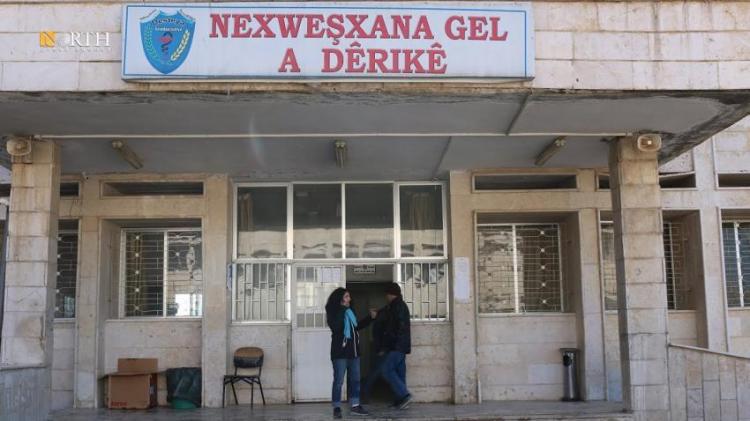QAMISHLI, Syria (North Press) – After the Autonomous Administration recorded four infections with coronavirus in the cities of Qamishli and Hasakah on Thursday, hospitals and quarantine centers in the Jazira region are on high alert.
The Health Boards in the Autonomous Administration in Qamishli, Hasakah, and Derik revealed special hospitals that were completely or partially prepared previously to receive critical infections, in addition to rooms and sections to be used in case the number of infections increased.
The co-chair of Health Board, Rojin Ahmad, said that the hospital of the city has been turned into intensive care room, with three respirators, for critical infections.
She added that a special section is being prepared for cases of coronavirus infection at Deirk Hospital with the support of the Italian organization UPP, which provides health supplies to equip the department.
The Autonomous Administration Health Board recorded four coronavirus infections on Thursday, pointing out that “the conditions of these cases are stable and are subject to a home quarantine.”
The Administration announced a group of precautionary measures for 15 days, including the closure of crossings, subjecting humanitarian cases who enter to the area to a 14-day quarantine, in addition to banning gatherings in such as weddings, wakes, and group prayers.
The Health Board spokeswoman in the Qamishli region warned that residents do not respond to crisis management team decisions or "do not take them seriously.”
She stressed that the quarantine center in Alaya district in east Qamishli, is equipped with an intensive care room and artificial respirators, with the possibility to form another quarantine center in Amude town, west of Qamishli.
Ahmed expected that the actual number of those in contact with the infected is greater than what was announced, "because one of the infected had visited doctors' clinics, medical laboratories, and radiology centers in order to receive treatment for a previous illness," stressing that “the total number of contacts has not been counted."
The Kurdish Red Crescent announced on Friday that the number of people who came in contact with infected people reached 88.
The spokeswoman of Hasakah Health Board, Seham Mala Ali, said that in coordination with the Internal Security Forces (Asayişh), they took all measures into consideration, "to stop unauthorized arrivals to Autonomous Administration areas, transfer them to the Health Board and place them in quarantine.”
Ali said that “the public hospital in Hasakah equipped an intensive care room with artificial respirators, in anticipation of any severe case of coronavirus.”
Regarding the infected case in Hasakah, she added that “the case was subjected to a home quarantine, because [this person] came in contact with the whole family, who were also subjected to a quarantine with other contacts until they recover.”
A medical source said that “the COVID-19 hospital for infections in Hasakah has not entered service yet, and only guards are there.”
According to the same source, there is a lack of medical equipment and services, while they work to prepare respirators.
The spokeswoman did not comment on the readiness of the COVID-19 hospital in Hasakah.
The Autonomous Administration is facing difficulties in combating the coronavirus outbreak due to the closure of Yaarobia and Tel Kochar crossings with Iraq to the entry of humanitarian and medical aid since the beginning of this year, despite the demands from dozens of international and local civilian organizations to reopen it during the past two months.
Co-chair of the Autonomous Administration Health Board Jiwan Mustafa told North Press that preparations and medical capacities in the region are not equal to other countries in this field, but “they will enable them, to a certain level, to confront coronavirus.”
(Reporting by Jindar Abdulqader, editing by Lucas Chapman)

